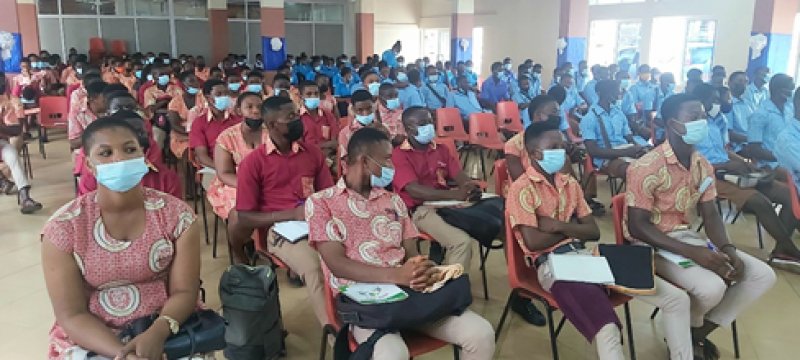A Technical and Vocational Education and Training (TVET) Consultant, Dr Stephen Turkson, says TVET is a critical instrument for national development and it should not be downplayed by political actors.
He said countries that prioritized TVET concepts had made significant economic gains, which implied that vocational training must not be politicized by any country, which was eager to develop and create employment for its youth.
“We should not politicize TVET, because it is for national development, whichever party that comes into power, the focus should be there, because that is where we should go as a country”, he stated
Dr Turkson was speaking at a job/career fair organized for some selected technical and vocational training institutions in the Ashanti region.
The fair was organized by Vocational Training for Females (VTF) programme, a church-based NGO dedicated to creating employment opportunities in TVET for the youth, especially females.
It was attended by students from the Kumasi Technical Institute (KTI), Community Development Technical Institute (CODTECH) at Kwamo, National Vocational and Technical Institute at Suame, Methodist Women Training Centre and Ramseyer Vocational/Technical Institute.
The World Bank, according to Dr Turkson projects that 80 percent of worldwide activities was centered on TVET which depicted that it was a powerful tool for development.
He cited the Asian countries as those that had used TVET as their national agenda, pursued it for economic growth and dominance over other parts of the world.
Dr Turkson pointed out that if Ghana had attached seriousness to TVET policy which was made way back in 2007, the country would have made headway.
He, however, commended the government for putting policies and structures in place to promote vocational education in recent times.
Dr Turkson urged parents to identify the potentials of their wards to prevent pushing children into liberal and humanities fields which might have not been their pitch of expertise.
VTF Director, Linda Agyei, said the transition from school to the labour market had become a problem due to a number of reasons, and was now worse due to the current disruptions all over the world as a result of the COVID-19 pandemic.
Aside from this, she said, there was a defective educational structure which only focused mainly on knowledge acquisition without emphasis on industrial skills.
She called on the government to be more concerned about the situation and forge ways to provide vocational and technical skills to the youth to make them self-employable
Latest Stories
-
We’ll cut down imports and boost consumption of local rice and other products – Mahama
1 hour -
Prof Opoku-Agyemang donates to Tamale orphanage to mark her birthday
2 hours -
Don’t call re-painted old schools brand new infrastructure – Prof Opoku-Agyemang tells gov’t
3 hours -
Sunon Asogli plant will be back on stream in a few weeks – ECG
3 hours -
ECOWAS deploys observers for Dec. 7 election
3 hours -
73 officers commissioned into Ghana Armed Forces
3 hours -
Impending shutdown of three power plants won’t happen – ECG MD
3 hours -
Ghana shouldn’t have experienced any ‘dumsor’ after 2017 – IES Boss
4 hours -
Lamens flouted some food safety laws in re-bagging rice – Former FDA Boss Alhaji Hudu Mogtari
5 hours -
Afcon exit: Our issue is administrative failure and mismanagement, not lack of talent – Saddick Adams
5 hours -
WAPCo to commence major pipeline maintenance and inspection from November 25
5 hours -
CEO of Oro Oil Ghana Limited Maxwell Commey listed among the 100 Most Influential People Awards, 2024
6 hours -
Power crisis: Amandi is off due to maintenance, not debt – ECG Boss
6 hours -
Votes cast for late Akua Donkor to be declared invalid – Electoral Commission
6 hours -
You can’t keep “incompetent” Otto Addo for the long term – Countryman Songo
6 hours

